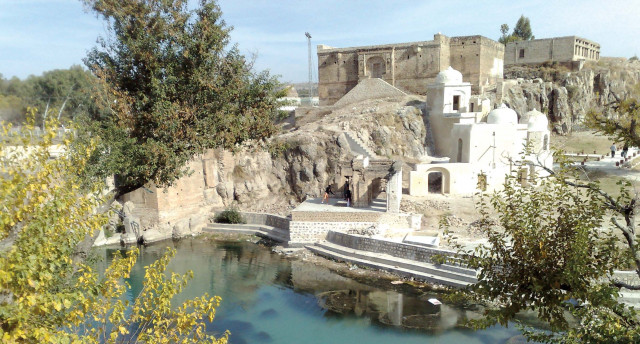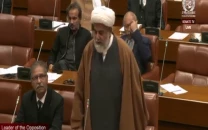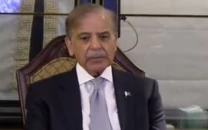SC determined to resolve issues of minorities, says CJP
Asks Pakistan Hindu Council to submit in writing grievances of the Hindu community

A view of Katas Raj Temple in Chakwal. PHOTO: FILE
“Protection of minorities is part of Islam,” the CJP, heading a three-judge bench, noted on Thursday. He also asked the Pakistan Hindu Council representative Dr Ramesh Kumar to submit in writing the grievances of the Hindu community.
The bench also issued notices to four factories, which are situated near the Katas Raj. The residents of that place claim that the underground water in the area is receding due to functioning of these factories.
SC orders Punjab govt, Bestway cement factory to fill up Katas Raj Temple pond within 7 days
Punjab’s Additional Advocate General Asma Hamid submitted reports on behalf of different provincial government departments. The reports said the Katas Raj pond had been refilled up to eight feet, to which the CJP remarked that the water level had to remain at that level at all times.
The pond – believed to be created from the teardrops of the Lord Shiva – is said to be drying up because of the nearby cement factories which have allegedly drilled hundreds of bores, severely reducing the subsoil water level.
The apex court also sought complete financial details of the Evacuee Property Trust Board’s (EPTB) properties and income, generated by them and expressed annoyance over non-appearance of the EPTB Chairman Sidiq ul Farooq.
“Why the chairman should not be removed and the court take over the board?” it asked. Later, the bench warned that if information about the properties and income is not provided to the court, the chairman may have to leave his post.
Katas Raj temple restoration: CM orders ban on industrial units around historic site
The bench noted that a person occupying a high-level post had to be vigilant on all things including the legal aspects but the current chairman had been appointed on the basis of political affiliation.
During the hearing, Dr Ramesh Kumar told the bench that in Israel, the head of a similar body is a member of the minority community. However, the bench asked him why he as a member of the ruling party did not attempt to form similar legislation in Pakistan.
Obliquely commenting on the Pakistan Tehreek-e-Insaf chief Imran Khan’s derogatory comments on parliament, the CJP said regardless of what somebody says about parliament, the SC believes that the parliament is the supreme body. The case was later adjourned for 15 days.









1733130350-0/Untitled-design-(76)1733130350-0-208x130.webp)









COMMENTS
Comments are moderated and generally will be posted if they are on-topic and not abusive.
For more information, please see our Comments FAQ